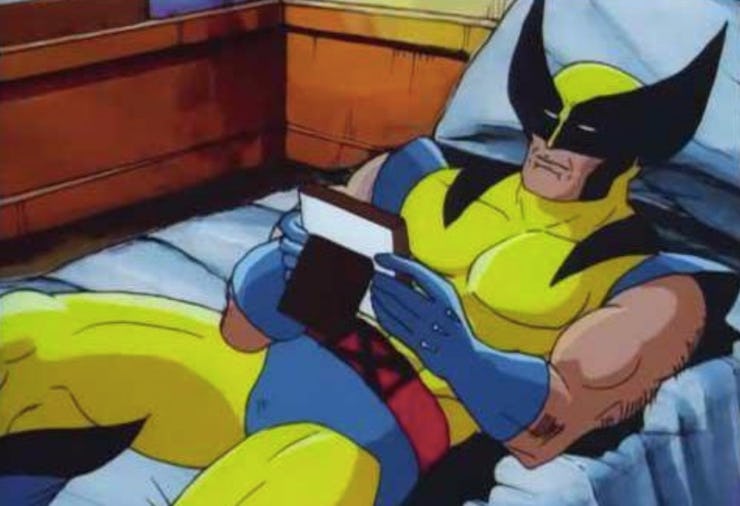X-Men '97 could fix Fox’s biggest mistake from the movies
Marvel bringing back the beloved Animated Series is a bigger deal than you think.

Well, what would you prefer? Yellow spandex?
With those seven words, 2000s X-Men revealed the biggest flaw with 20th Century Fox’s vision for Marvel’s beloved superhero team. And while the franchise would go on to include some of the best movies in superhero history (and also some of the worst), it would always be held back by X-Men’s initial obsession with tight black leather over the character’s more outlandish original costumes.
It wasn’t like X-Men fans weren’t primed for those yellow spandex suits. Leading up to the movie’s debut, X-Men: The Animated Series was one of the most popular superhero shows on TV, spawning an entire cinematic universe that included Spider-Man: The Animated Series, The Incredible Hulk, Iron Man, Fantastic Four, and The Silver Surfer. And yet, the movies practically pretended the show didn’t exist. That was kids' stuff. This is serious.
Now, with Marvel Studios rebooting the beloved cartoon as X-Men ‘97, the company has a chance to return the superhero team to their bizarre roots, potentially setting the stage for the X-Men that join the Marvel Cinematic Universe in live-action to be much more attuned to the franchise’s outlandish and often cosmic comic book roots.
X-Men: The Animated Series ran from 1992 to 1997 on the Fox Kids Network. It was essential viewing for ‘90s kids, and while it didn’t have quite the same consistent artistry and cross-media impact as Batman: The Animated Series, it proved to be just as crucial in producing young comic book fans.
X-Men was my introduction to much of the larger Marvel Universe outside of Spider-Man, who received his own animated series in 1994 following the success of X-Men. Even if the Marvel Studios revival of X-Men: The Animated Series isn’t quite as ambitious as what we saw in the ‘90s in terms of subsequent shows and crossovers, it still has a strong chance to be just as formative for a new generation of fans, while increasing older fans anticipation for the X-Men’s debut in the MCU.
X-Men: The Animated Series rarely delivered straight adaptations of the comics, but it captured the spirit of Chris Claremont’s redefining run on Uncanny X-Men and later X-Men. Classic comic arcs like Weapon X, The Dark Phoenix Saga, Days of Future Past were all adapted by the cartoon, often better than the movie versions we got later on. (The Phoenix Saga, in particular, is a perfect example of how the Animated Series understood the source material better than the films, leaning into the intrinsic weirdness of the X-Men while giving this epic story the thematic breathing room it needs.)
X-Men: The Animated Series didn’t shy away from the comic’s more mature themes either. From anti-mutant sentiment as an allegory for both racism and homophobia to the implications of sci-fi concepts like time travel, the cartoon never talked down to its audience. (The cartoon served as an “Introduction to Science Fiction” long before many of us would dive further into the genre with Star Trek, The X-Files, and Doctor Who.)
Ultimately, The Animated Series worked, not despite the yellow spandex, but because of it. Or rather, because of what it represented: a fundamental understanding of the stories it was adapting.
Make no mistake, I’m a fan of what the franchise accomplished. Hell, I’ve even got a soft spot for X-Men Origins: Wolverine (2009), Dark Phoenix (2019) and The New Mutants (2020). But even the best of them — X2 (2003), X-Men: First Class (2011), X-Men: Days of Future Past (2014), and Logan (2017) — are a far cry from the comics.
X-Men ’97 can re-focus the idea of the X-Men back towards the comics.
The X-Men movies were perenially caught between two identities: the sleek too-cool-for-spandex post-Matrix vibes of the 2000s, and the shift towards more colorful and comic-booky style brought about by Marvel Studios. The original movies tried to be more “grounded” but came off feeling aloof. The later ones moved closer to the Animated Series but were still bogged down by Fox’s convoluted cinematic universe.
For many superhero fans, Fox’s X-Men movies are their primary concept of the characters, and while there’s nothing wrong with that, it means missing out on a lot. Even you only ever watched these films, you’d assume Wolverine is the most important character, every conflict comes down to Professor X vs. Magneto, and Cyclops is kind of a useless jerk (until Tye Sheridan’s update).
With X-Men ‘97 and a return to the Animated Series, Marvel has a chance to set the record straight for a new generation of fans.
Maybe the next X-Men villain doesn’t need to be Magneto...
X-Men ’97 can re-focus the idea of the X-Men back towards the comics. That means colorful costumes, threats larger than Magneto, and a species whose interaction with the world is more than closed room meetings and hearings. X-Men ’97 is a chance for the property to embrace its identity as a weird soap opera once more.
The Marvel Cinematic Universe is a very different place from Fox’s X-Men franchise. X-Men ’97 can bridge the gap. It can reintroduce characters who didn’t appear in the previous franchise or weren’t given the screentime they deserved. And, hopefully, it can prime Marvel fans for the arrival of classic villains we’ve never seen in live-action like Mister Sinister, Omega Red, and a version of Phoenix who is fully a conscious cosmic entity that definitely slept with Odin (comics!).
X marks the spot, and I have a feeling this next decade is going to bring a lot of joy to Mutant fans both new and old. But before that can happen, Marvel needs to reorient the X-Men. Thankfully, it looks like that effort is well underway.
THANKS FOR READING, AND AS ALWAYS, KEEP YOUR MIND IN THE GUTTER!
This article was originally published on